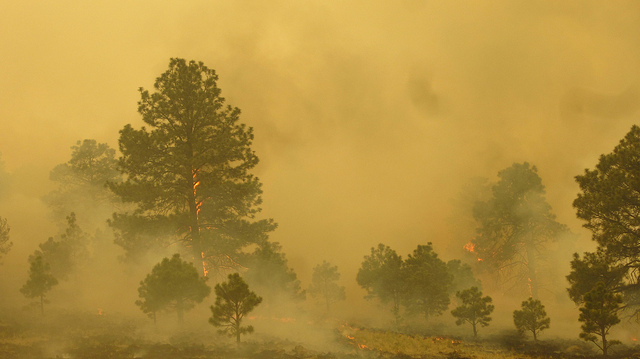
Photo by Chris Ader on Flickr Creative Commons
This past year, UCLA students have been exposed to severely unhealthy air conditions due to wildfires in surrounding areas. Massively destructive wildfires have become more and more frequent in California, and are part of a worsening trend due to increasing dry and warm weather conditions state-wide each year. These fires are projected to become more frequent, and as such it is crucial that more students understand how to properly protect themselves from smoke inhalation, and prevent any health complications in the future from repeated exposure.
1. Check the AQI
The AQI, or the Air Quality Index, is a scale that measures air toxicity by rating it from 0-500 in six different categories–0 being good, 500 being hazardous. If you want to know how the air quality is on a given day, a simple Google search with your location is enough to find the number, and there are also smartphone apps with similar functions that you can download.
At what point on this scale to start wearing a mask depends on personal preference, age, and your medical history. If you have respiratory conditions such as asthma, take extra caution on these bad days if you have to go outside. But for the average, healthy, college-aged adult, anything after 200 is when it starts getting really dangerous, and prolonged exposure without a mask is going to take a serious toll on your health and your breathing. (Keep in mind this is the upper limit. The earlier you start wearing a mask on this scale the better.)
2. Buy the right mask and know how to use it
Throw away your bandannas and surgical masks, because an R95 respirator is the only thing that’s going to help you. (If you don’t know what that is, picture the masks that contractors and carpenters wear, but make sure it says R95 on the front.) Before you go out in your R95, look up the proper fitting for the straps and make sure you are wearing it correctly, or it won’t work like it’s supposed to. IMPORTANT: these masks will lose effectiveness after some time, so it is advised to change them every hour if you are forced to be outside for long periods of time. Stock up!
3. When you’re home, close all windows and doors, and turn off any ventilation systems
Check every room in your apartment/house and make sure none of the windows are even slightly cracked. If you have air conditioning or a heating system, it’s best to turn it off for the time being in case it’s circulating air from the outside. If you have any noticeable gaps at the base of your front door leading outside, try plugging it with a rug or a towel until the air clears. Limit physical activity during this time, even inside the house–save your physically demanding housekeeping chores for another day.
Just as a rule of thumb: It’s better to be cautious now than unhealthy later. Don’t just rely on your eyes alone–there are harmful particles in this type of smoke that are too small for us to see. The smoke may appear to clear up on a particular day, but look up the AQI to get the real story. Also, if you know the air quality is bad, but you think you’re being dramatic by wearing a mask that day because no one else is wearing one, just do it! Your lungs will thank you.
Stay safe, Bruins!
